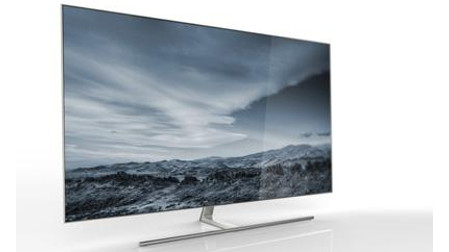CES 2017: Samsung Promotes Better Looks On & Around New TVs
LAS VEGAS—Samsung is bringing newly developed metal-core quantum-dot technology to select 4K Ultra HD TVs.

Samsung's Q9F TV
The enhancements will boost peak brightness to 2,000 nits from 1,000 and 1,200 nits in last year’s line, expand color volume by 20 percent, and deliver wider off-axis color accuracy.
The technology, appearing in the top-end Q9F, Q8 and Q7 4K TVs, expands color gamut to 99 percent of the P3 standard from 96 percent in the company’s top 2016 quantum-dot models, producing a “noticeable” improvement, said TV product marketing GM Brandt Varner.
All of Samsung’s 2016 4K TVs met Ultra HD Alliance (UHD-A) performance criteria, and Samsung’s “target” is for all 2017 models to meet the criteria, Varner added before the show.
Also at CES, Samsung is:
- Expanding its 4K Blu-ray player selection to two;
- Sticking only with HDR 10 high-dynamic-range technology in its new 4K TVs and 4K Blu-ray players, leaving out Dolby Vision HDR technology;
- Officially retiring the SUHD moniker applied to 2016’s highest performing 4K TVs, which used a previous generation of quantum-dot technology; and
- Offering about the same number of curved TVs as it did in 2016, though its flagship Q9F series will be flat in contrast to its 2016 flagship series, which was curved.
To make the TVs look better in the home even before they’re turned on, the company is:
- Launching a new wall-mount system for the top Q9F and Q8 series to simplify DIY installation and deliver a “near-zero gap” between the wall and the TV chassis.
- Improving the appearance of on-wall installs in the Q9F and Q8 series by using a “virtually invisible” clear, thin 15-foot optical digital cable in place of a thicker round cable to carry audio and video to the TVs from the company’s One Connect A/V-switching box. The box was also available in last year’s lineup. A 36-inch optical cable is also due.
- Introducing a new cable-management system that hides all wires inside the stands of most 4K TVs before emerging to connect with the company’s One Connect input-switching box.
No SUHD: In retiring the SUHD designation, Samsung is replacing its SUHD lineup with the MU8 and MU9 series, which drop their predecessors’ quantum-dot displays while still delivering 1,000-nit peak brightness, Varner said. The MU8 models will deliver the wide color gamut of their predecessors, and the MU9 models will deliver a wider gamut than their predecessors, thanks to a new non-reflective screen, he said.
Also new are the entry-level MU6 and MU7 series, which like their predecessors lack quantum dots.
All MU series except the MU9 will feature both curved and flat models, while MU 9 will feature only flat screens.
The number of models and screen sizes in all of the new 4K series was unavailable.
Metal-core dots: In describing the performance of the Q series’ metal-core quantum dots, Varner said the technology delivers peak brightness of 2,000 nits with “no tradeoff between high luminance, wide color gamut and high contrast.” Color saturation doesn’t drop as brightness goes up, he added.
The new technology also “improves diffusability,” expanding the direction of light to reduce the rate at which the perception of color changes at off-axis viewing angles, Varner said. Additional details were unavailable.
New Features: For the Q series TVs, an optional wall-mount bracket slips inside the back of the TVs, and the TVs hang like a picture frame from a flat rectangular plate attached to the wall to deliver a “near-zero-gap” between TV and wall. The TV can be straightened by hand and locked into place without any tools, so the wall plate doesn’t have to be installed completely horizontal, Varner said. The TVs tilt down up to 15 degrees for mounting over a fire place.
Q series models will also add such new features as no-lag PC gaming, thanks to the addition of Steam’s app for accessing PC games through Steam’s Cloud service without having to connect a PC.
The Q series also adds an improved smart remote, which makes it easier to find key cable-box functions, and a new smartphone app. The app puts the TV’s UI on the small screen and lets users continue to watch live TV on the big screen as they use the phone’s display to browse through the content of such smart-TV services as Netflix or Amazon.
UHD Blu-ray: In expanding its UHD Blu-ray selection to two, the company will offer a basic model and a step-up model, both with curved fronts like the lone 2016 model. The step-up model adds multiple features, including a display and a Bluetooth transmitter, which streams audio to headphones from the player and from a connected AVR.
The step-up model also adds Blu-ray-to-mobile and mobile-to-Blu-ray capabilities. With the former, users stream 4K disc content to a tablet or phone at home while someone else watches TV programs on the TV screen. With mobile-to-Blu-ray, users stream content from the phone to a TV through the 4K Blu-ray player.
The step-up also adds dual HDMI outputs, one to carry Blu-ray surround sound to older audio/video receivers that lack HDMI 2.0 inputs with HDCP 2.2 copy protection.
All Samsung TV remotes will also now control all Blu-ray player functions
Neither player offers optional store-and-export capabilities, which store disc content on a hard drive for quick access and export disc content to a mobile device for on-the-go viewing.
For the latest news on CES, visit our sister publication, and publisher of the official CES Daily, TWICE magazine.
Get the TV Tech Newsletter
The professional video industry's #1 source for news, trends and product and tech information. Sign up below.
